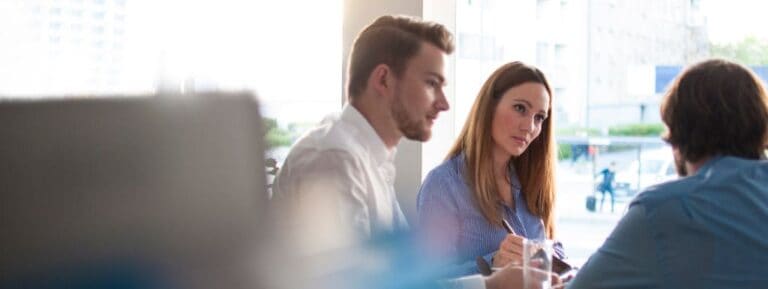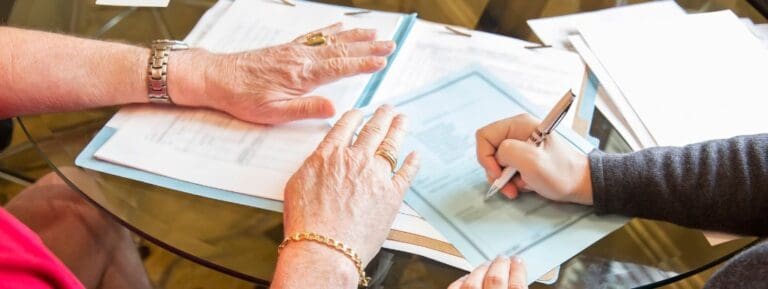Challenging a Will – What Evidence Do You Need?
Can a Will still be valid despite a dementia diagnosis and expert evidence suggesting lack of capacity?
Fresh off the press: NSWCA in Peacock v Knox [2025] NSWCA 160 upheld the primary Judge’s decision to grant probate of a will despite a neuropsychologist’s opinion on lack of capacity.
Mrs Peacock and the 2019 Will
- The Deceased, Eva Easton died at the age of 89 on 11 September 2021.
- Easton met Mrs. Peacock (the Defendant) in or around 2004 when she began using Mrs. Peacock’s services for monthly massages. By 2009 they had developed a close friendship.
- In or around 2017 Mrs. Easton moved into Marantha aged care with the assistance of Mrs. Peacock, during this time she would visit her friend and assist with her daily activities.
- On 2 April 2019 Mrs. Easton executed an enduring power of attorney and enduring guardianship in favour of Mrs. Peacock. By 29 May 2019, Mrs. Easton made a Will appointing Mrs. Peacock as executor and sole beneficiary of her Estate (the 2019 Will).
Covid-19 and the 2020 Will
- In or around March 2020 Maranatha lodge required that any visitors to the aged-care centre were vaccinated for influenza. Peacock was not willing to get the vaccination, and therefore could not visit Mrs. Easton.
- By mid-March 2020 clinical notes from staff at Maranatha lodge and her occupational therapist revealed that Mrs. Easton was angry and upset that Mrs. Peacock would not visit her. Of particular concern to Mrs. Easton was the lack of financial management without Mrs. Peacock’s assistance.
- Easton was referred to the Older Persons Advocacy Network (OPAN) after expressing her frustration with Mrs. Peacock and her desire to change her Will. Around this time a registered nurse performed a Mini-Mental state examination on Mrs. Easton, on which she scored 24/30.
- On 19 November 2020, Mrs. Easton executed a will by which she left her entire estate to the Sydney Opera House Trust, and appointed the drafting solicitor, Mr. Knox, as executor and trustee (the 2020 Will).
The Decision at first instance
Mr. Knox sought probate of the 2020 Will in solemn form. Justice Hmelnitsky found that the Deceased had mental capacity at the time of the 2020 Will, and that it should therefore be admitted to probate.
His honour relevantly weighed up competing evidence from:
- Peacock – friend and sole beneficiary under the 2019 Will (as to lack of capacity);
- Lonie – jointly appointed expert neuropsychologist (as to lack of capacity)
And:
- Flannery – treating occupational therapist (as to sufficient capacity)
- Langley – treating general practitioner (as to sufficient capacity)
- Knox – attending solicitor and draftsman of the 2020 Will (as to sufficient capacity)
The evidence can broadly be divided into two categories – lay evidence and medical evidence. Only Dr Lonie and Dr Langley were qualified to give medical evidence (noting that Dr Langley admitted he was not an expert, nor sufficiently qualified to comment up Dr. Lonie’s expert report).
How can a court decide against evidence from an expert neuropsychologist?
So how could his Honour find that the deceased had capacity to make the 2020 Will, despite the report of an unbiased, expert neuropsychiatrist that suggested a lack of capacity?
The test for legal capacity to make a will is a legal, not medical test. To this day, courts are guided by the factors in the case of Banks v Goodfellow [1870], which identifies four conditions which must be satisfied:
- The testator must understand that they are making a will and that it involves disposing of their property.
- They need to have a general understanding of the property they own.
- The testator should be aware of individuals who might reasonably expect to be beneficiaries of their will.
- They must not be suffering from any mental illness or delusions that significantly affect their decisions about who should inherit.
With regards to how medical evidence applies to the above factors, his Honour quoted Young JA in Zorbas v Sidiropoulous (No 2):
“The criteria in Banks v Goodfellow are not matters that are directly medical questions, in the way that a question whether a person is suffering from cancer is a medical question. They are matters for commonsense judicial judgment on the basis of the whole of the evidence. Medical evidence as to the medical condition of a deceased may of course be highly relevant, and may sometimes directly support or deny a capacity in the deceased to have understanding of the matters in the Banks v Goodfellow criteria. However, evidence of such understanding may come from non-expert witnesses.”
His honour accepted the finding of Dr. Lonie, that the deceased was likely suffering from dementia from as early as 2017. This finding in itself however does not automatically invalidate a will. His honour reasoned:
“The law does not insist on an ability to weigh claims in a way that is altogether unaffected by cognitive impairment. I am prepared to accept Dr Lonie’s opinion insofar as she expresses the view that Mrs Easton’s capacity to weigh up claims of potential beneficiaries was affected by cognitive impairment; but I cannot accept that Mrs Easton lacked that capacity altogether. “
Lay evidence on capacity: Four observations
Again quoting Young JA in Zorbas v Sidiropoulous (No 2), his honour observed:
“In a probate suit, the vital evidence is very often not given by medical experts, but is given by experienced lay observers. I have said more than once in deciding probate cases at first instance, that the most valuable evidence is usually given by the experienced solicitor who witnessed the will as opposed to a very highly qualified psychiatrist whose evidence is based not on any personal observation of the testator, but who has reasoned his or her opinion from medical and hospital notes.”
There are four critical points that are reinforced by this decision:
- Relevant time period
The most important factor in weighing competing evidence as to capacity is proximity in time to the Will that is being challenged. In this case, Mrs. Peacock’s evidence (although found to be reliable) did not relate to the relevant period in time surrounding the execution of the 2020 Will. Evidence of the Deceased’s mental capacity prior to, and after the 2020 Will was of limited use.
- Proximity to the deceased
Judges have consistently expressed the view that evidence from family, friends and treating practitioners who were close to the Deceased is usually of far greater value than retrospective expert reports made “after the fact.” In this case, the evidence of Ms. Flannery (who saw the deceased as many as three times per week in the relevant period) was highly persuasive, and in fact weighed above that of the expert report of Dr. Lonie.
- Uninterested evidence
His Honour cautioned against reliance on lay evidence from those who stand to benefit if their evidence is accepted. His Honour stated:
“It is also necessary to keep in mind that Mrs Peacock, of all the witnesses, is the one witness who stands to gain from these proceedings. It has sometimes been said that, relatively speaking, the least satisfactory evidence is generally that of laypersons who stand to benefit under the will: Gooley v Gooley at [722] (Sackar J)”
- Evidence from the lawyer who witnessed the Will
Courts are inclined to accept evidence from diligent and experienced legal practitioners who witness wills. In this case, the oral evidence from Mr. Knox (and his contemporaneous note taking) played a significant role in convincing the court that the proper tests for legal capacity had occurred.
Conclusion
The formation or change of a Will late in life is often a stressful event for all parties, and precautions need to be in place to ensure that the last will and testament of a person are enacted.
If you, or a loved one are seeking to create a new Will or challenge or uphold one, get in contact with Michael Sing from Rostron Carlyle Lawyers to discuss your options.
The blog published by Rostron Carlyle is intended as general information only and is not legal advice on any subject matter. By viewing the blog posts, the reader understands there is no solicitor-client relationship between the reader and the blog published. The blog should not be used as a substitute for legal advice from a legal practitioner, and readers are urged to consult Rostron Carlyle on any legal queries concerning a specific situation.



